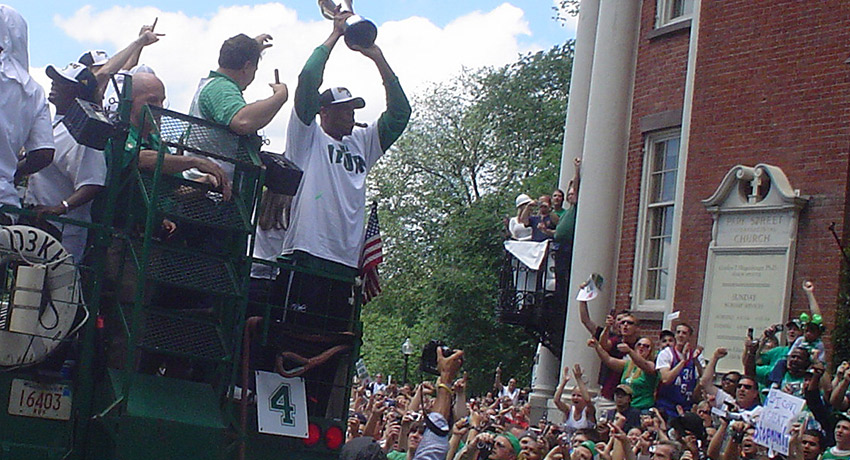The Paul Pierce Effect

Paul Pierce celebrating with his Finals MVP Trophy. Photo via Flickr/Michael Femia
Who’s sad?
We all are. If you’re a Celtics fan, casually or not, it has to sting when a player that’s been on the team for 15 years is traded—no disrespect to Kevin Garnett, whose remarkable six season tenure is now considered a lifetime to be on one team.
As it sinks in that Mr. Pierce is no longer a player on the Boston Celtics, and will not be retiring as a Celtics forward, if you feel sad, you’re not alone. “I feel sad, too,” says Dr. Steven Schlozman, psychiatrist at Mass. General Hospital and professor at Harvard Medical School. “There are some sort of obvious things as I think about it all. First, Pierce is a stand-up guy. He’s a great player, had clutch moments right out of movies, but also was and probably still is genuinely grateful for the chance to be good.”
The interesting question is that why do we, as fans, make these things personal, when they have nothing to personally do with us? People can argue that because we are spending our time watching, and our hard earned cash buying tickets, clothing, and ridiculously overpriced cable packages, that is why it becomes personal. We are invested both emotionally and financially to our teams and long term players.
“I don’t make the Celtics fun, I don’t coach the team, I don’t play for them, whether I work hard or not has no real impact on how they play, and yet, they feel like their mine,” Schlozman says. “And by being mine, they’re part of my community. I can talk about them to others whom I barely know in a bar or with someone on the bus and we got something in common. In a disconnected world, having something in common is no small thing.”
There is also the breakup factor. When you’re fan for 15 years, and then all of a sudden you aren’t supposed to be a fan anymore it’s tough. Nevermind the dreaded need to get back out there and start dating someone new. “I think we identify with these guys. We feel their pain, their triumphs, their hard work…and when they leave us, it’s like part of us leaves,” Schlozman says. “That’s a lot like a break-up.”
This trade is the slap back into reality that we need sometimes to remind us to not take it personally. That we are built, as humans, to care. “The move reminds us that it is, of course, a business. Now I gotta start over and get to ‘know’ some new [players],” Schlozman says. “There is a kind of nostalgia that at least I think a lot about.”
So don’t take it personally. It’s okay to feel sad. We all do.


